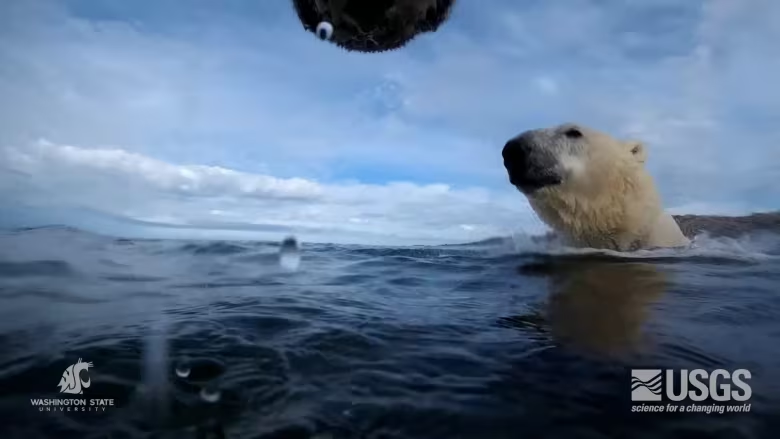
A polar bear swimming in Hudson Bay near Churchill, Man., was filmed using a video collar as part of a research initiative led by the U.S. Geological Survey. The study aimed to monitor polar bear diets and energy expenditure when sea ice is absent.
In the vast expanse of the Arctic, where ice and snow dominate the landscape, the iconic polar bear faces a growing challenge: the disappearance of its icy hunting grounds due to the relentless march of climate change.
Recent research, detailed in a study published in Nature Communications by a team led by the U.S. Geological Survey, sheds light on the plight of these majestic predators during the summer months. Far from the popular notion of a carefree existence, summer for polar bears is a period of immense struggle.
Traditionally, these apex predators thrive on a diet rich in fatty seals, hunted from the sea ice. However, as human-induced climate change extends the duration of ice-free periods, the bears find themselves confronting scarcity. The study, conducted near Churchill, Manitoba, meticulously tracked the movements and behaviours of 20 polar bears over three summer weeks.
What emerged from the data was a poignant narrative of survival against the odds. While some bears resorted to conserving energy on land, relying on fat reserves akin to hibernation, others embarked on desperate quests for sustenance. From foraging for berries to scavenging carcasses and even swimming vast distances, the bears displayed remarkable adaptability.
Yet, despite their diverse strategies, nearly every bear experienced weight loss, averaging about a kilogram per day. This grim reality underscores the severe limitations imposed by their changing environment. Even the most resourceful individuals could not evade the harsh toll of diminishing food sources.
The study's findings are sobering, prompting reflection on the future of polar bears in a rapidly warming world. As ice-free periods lengthen, the window for hunting seals narrows, pushing the bears towards precarious thresholds of survival.
Experts warn that unless significant action is taken to mitigate climate change and its impacts, polar bear populations face a bleak future. Classified as a species of special concern and vulnerable by conservation organizations, polar bears confront a perilous trajectory.
University of Alberta professor Andrew Derocher, with decades of experience studying polar bears, emphasizes the urgency of addressing this crisis. He notes that continued warming could lead to population declines and even local extinctions within the next few decades.
In the face of these dire prospects, conservation efforts take on heightened importance. From reducing emissions to implementing non-lethal strategies for coexistence in Arctic communities, there's a collective responsibility to safeguard these iconic creatures.
As the Arctic landscape undergoes profound transformations, the fate of polar bears serves as a poignant reminder of the urgent need for global action to combat climate change and protect our planet's precious biodiversity.















